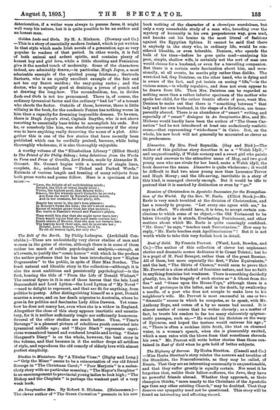The Salt of the Earth. By Philip Lafargue. (Archibald Con-
,stable.)—These are undoubtedly very clever studies of men and -women in the guise of stories, although there is in some of them rather too much of subtle psychological analysis,—enough, at all events, to justify the" comic horror" with which in the preface the author professes that he has been introducing new "Higher Degenerates" to the public, in spite of Herr Max Nordau. The least natural and likeable story in the collection—although it is also the most ambitious and persistently psychological—is the first, bearing the title of "From the Life of Donald Wishart." The central figure in it is one of those heroes that the late Lord Beaconsfield and Lord Lytton—the Lord Lytton of "My Novel" —used to delight to represent, and that are fit for anything, from politics to poetry. After distinguishing himself as a poet, Donald marries a nurse, and on her death migrates to Australia, where he goes in for politics and fascinates Lady Alice Dawson. Yet some- how he does not marry her, even when she is a widow in England. Altogether the close of this story appears inartistic and unsatis- tory, for it is neither sufficiently tragic nor sufficiently humorous. Several of the other studies are much better. Thus, "Time's Revenge" is a pleasant picture of rebellions youth converted into tyrannical middle age ; and "Major Stark" represents capri- cious womanhood tamed and rendered lovable and loving. "Sister Margaret's Diary" is on the whole, however, the best story in the volume, and that because in it the author drops all artifices of style, and reproduces the old comedy of elderly love with almost perfect simplicity.


































 Previous page
Previous page